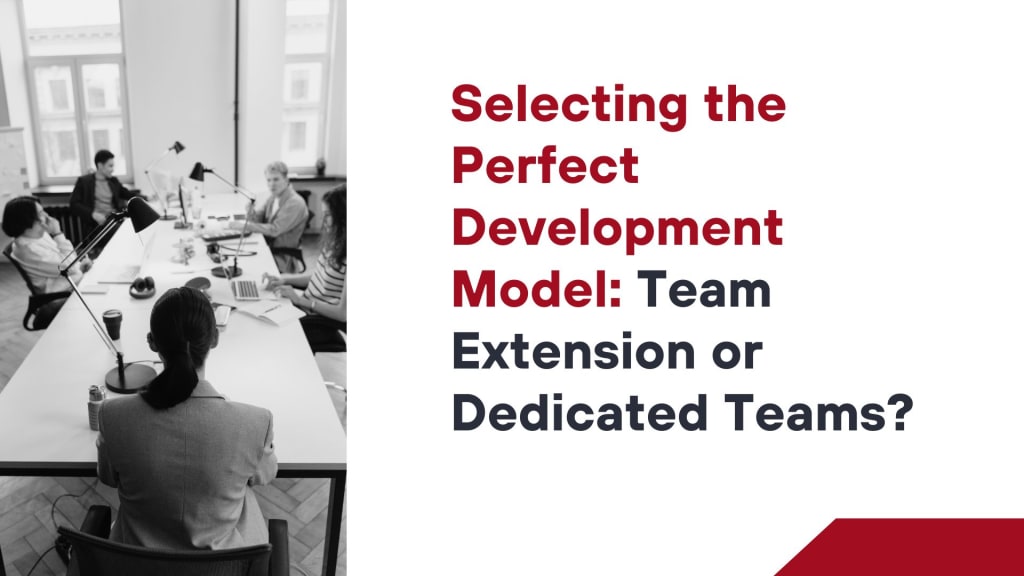
In the fast-paced world of software development, choosing the right development model can make all the difference between success and frustration. Two popular options in this arena are "Team Extension" and "Dedicated Development Teams." These models offer unique advantages and disadvantages, and selecting the perfect one for your project can be a critical decision. In this blog, we'll explore the differences between these two approaches and help you make an informed choice.
Team Extension:
Team Extension is a development model where you hire individual developers or small groups of experts to augment your existing in-house team. This model provides flexibility and allows you to bring in specialized skills when needed.
Pros of Team Extension:
- Cost-Efficiency: Team Extension can be cost-effective as you only hire additional resources when required. This eliminates the overhead of maintaining a full-time team.
- Specialized Skills: You can easily access experts in specific technologies or domains for short-term projects without committing to long-term contracts.
- Faster Scaling: It allows for quick scaling up or down based on project requirements, making it ideal for agile development.
However, it's worth noting that according to a survey by Deloitte, 71% of organizations consider cost reduction as the primary driver for hiring dedicated offshore development teams.
Cons of Team Extension:
- Communication Challenges: Managing a dispersed team can lead to communication hurdles, affecting project coherence and efficiency.
- Lack of Commitment: Team Extension members may not have the same level of commitment or loyalty as in-house staff.
- Coordination Complexity: Coordinating between multiple remote team members can be challenging and time-consuming.
Dedicated Development Teams:
Dedicated Development Teams involve hiring an entire team, often located offshore, to work exclusively on your project. This model offers a high degree of control and long-term commitment.
Pros of Dedicated Development Teams:
- Full-Time Engagement: Team members are fully dedicated to your project, fostering a sense of ownership and commitment.
- Streamlined Communication: With a single point of contact, communication is more streamlined, reducing the chances of misunderstandings.
- Cost Predictability: While upfront costs may be higher, long-term contracts provide cost predictability.
A report by the Project Management Institute (PMI) found that 58% of projects with dispersed teams face challenges related to communication and collaboration.
Cons of Dedicated Development Teams:
- Higher Initial Investment: Setting up a dedicated team can require a larger initial investment compared to Team Extension.
- Less Flexibility: It may be challenging to quickly scale down or change team members as project requirements evolve.
- Time Zone Differences: If the team is located in a different time zone, managing real-time collaboration can be tricky.
How to Choose Between Team Extension and Dedicated Teams:
Choosing between these two models depends on various factors:
- Project Scope and Duration: For short-term or smaller projects, Team Extension might be more suitable. For long-term, complex projects, Dedicated Development Teams could be a better fit.
- Budget Constraints: If you have a tight budget and need flexibility, Team Extension might be the way to go. Dedicated teams are a better choice when you can afford a more extended commitment.
- Technical Expertise: Assess your project's technical requirements. If you need highly specialized skills, Team Extension can provide quick access to experts.
- Communication Preferences: Evaluate your communication preferences and project management capabilities. If you prefer a single point of contact and more streamlined communication, Dedicated Development Teams may be preferable.
In conclusion, both Team Extension and Dedicated Development Teams have their merits, and the choice largely depends on your project's unique requirements and your organization's preferences. If you're looking to hire dedicated software development teams for a long-term, complex project, the Dedicated Development Team model might be the perfect fit. On the other hand, if you require flexibility, specialized skills, and short-term commitments, Team Extension can be a more cost-effective solution. Ultimately, the key is to align your choice with your project goals and budget constraints to ensure a successful software development journey.






Comments (1)
Thank you for this excellent article comparing the advantages of different development models, whether it's team extension or dedicated teams. It's a crucial decision for many businesses, and your insights provide a clear understanding of the pros and cons associated with each approach. For those interested in diving deeper into the world of extended development teams and how they can be a game-changer, I recommend checking out this article: https://www.cleveroad.com/blog/extended-development-team/. It offers a valuable perspective on choosing the right development model for your specific needs. Once again, thank you for sharing your knowledge on this essential subject. I hope both articles help readers make informed decisions about their development strategies.